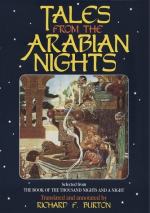When Maymunah heard these lines from the Ifrit, she said, “Thou hast done well, O Dahnash! But say thou which of the two is the handsomer?” And he answered, “My mistress Budur is handsomer than thy beloved!” Cried Maymunah, “Thou liest, O accursed. Nay, my beloved is more beautiful than shine!” But Dahnash persisted, “Mine is the fairer.” And they ceased not to wrangle and challenge each other’s words till Maymunah cried out at Dahnash and would have laid violent hands on him, but he humbled himself to her and, softening his speech, said, “Let not the truth be a grief to thee, and cease we this talk, for all we say is to testify in favour of our lovers; rather let each of us withdraw the claim and seek we one who shall judge fairly between us which of the two be fairer; and by his sentence we will abide.” “I agree to this,” answered she and smote the earth with her foot, whereupon there came out of it an Ifrit blind of an eye, humpbacked and scurvy-skinned, with eye-orbits slit up and down his face.[FN#259] On his head were seven horns and four locks of hair fell to his heels; his hands were pitchfork-like and his legs mast-like and he had nails as the claws of a lion, and feet as the hoofs of the wild ass.[FN#260] When that If rit rose out of the earth and sighted Maymunah, he kissed the ground before her and, standing with his hands clasped behind him, said, “What is thy will, O my mistress, O daughter of my King?"[FN#261] She replied, “O Kashkash, I would have thee judge between me and this accursed Dahnash.” And she made known to him the matter, from first to last, whereupon the Ifrit Kashkash looked at the face of the youth and then at the face of the girl; and saw them lying asleep, embraced, each with an arm under the other’s neck, alike in beauty and loveliness and equal in grace and goodliness. The Marid gazed long upon them, marvelling at their seemlihead; and, after carefully observing the twain, he turned to Maymunah and Dahnash, and reseated these couplets.
“Go, visit her thou lovest, and regard not
The words detractors utter, envious churls
Can never favour love. Oh! sure the Merciful
Ne’er made a thing more fair to look upon,
Than two fond lovers in each others’ arms,
Speaking their passion in a mute embrace.
When heart has turned to heart, the fools would part
them
Strike idly on cold steel. So when thou’st
found
One purely, wholly shine, accept her true heart,
And live for her alone. Oh! thou that blamest
The love-struck for their love, give o’er thy
talk,
How canst thou minister to a mind diseased?"[FN#262]




